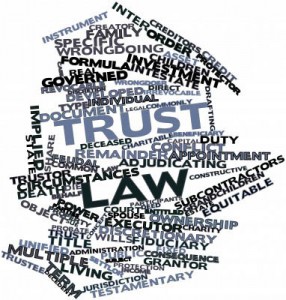Someone passed away. The Will names me as Executor. What do I do?
This Article intended for estate personal representatives

The Lawyer Blogs shown below are topical articles written by attorney David L. Crockett on all of the areas of the law that he deals with. Many of these articles are based upon actual and typical situations encountered by Mr. Crockett's clients. New blogs are posted when Mr. Crockett encounters new situations that merit detailed explanations to his clients. There is practical advice and explanations that span the subjects of the probate, trust, real estate and tax laws and court procedures that frequently arise. Because Mr. Crockett is actively advising clients on (i) wills, trusts, taxes and estate planning; (ii) administration of trusts and probate estates; and (iii) litigation about estates and trusts, many of these articles cover and crossover between all three areas of practice. The articles contain information that a person forming a trust, or a trustee or an heir/beneficiary needs to be aware of. The Blogs are organized into topics listed on the left of this page. You can view the posts listed in each topic here.


Probate court is generally necessary to transfer ownership of property and accounts upon someone’s demise. Thus, if a person has not organized his/her ownership of assets, a Probate Court proceeding will be necessary to access bank accounts, pay bills and taxes and to transfer ownership to the heirs.
A living trust is one of the key ingredients in most estate plans. The living trust is widely used because of its flexibility. When people but their money and property into a living trust probate can be avoided and estate taxes saved.
 A revocable intervivos trust is a trust created during the Trustor’s lifetime (as opposed to a trust created as part of one’s will). A Revocable Living Trusts is often called a “Living Trust.” The Trustor is the person who establishes the trust. Assets transferred into the trust by the Trustor can be removed from the trust and given back to the Trustor whenever the Trustor decides. Typically, the trust is set up so the Trustor is also the beneficiary during his or her lifetime and thus receives all the trust income during his or her lifetime and has a right to withdraw trust principal when desired. The person who has legal title and control of the trust assets is known as the Trustee. Typically the Trustor is also the Trustee of a Living Trust during his lifetime and whomever he appoints is the Trustee following the Trustor’s death.
A revocable intervivos trust is a trust created during the Trustor’s lifetime (as opposed to a trust created as part of one’s will). A Revocable Living Trusts is often called a “Living Trust.” The Trustor is the person who establishes the trust. Assets transferred into the trust by the Trustor can be removed from the trust and given back to the Trustor whenever the Trustor decides. Typically, the trust is set up so the Trustor is also the beneficiary during his or her lifetime and thus receives all the trust income during his or her lifetime and has a right to withdraw trust principal when desired. The person who has legal title and control of the trust assets is known as the Trustee. Typically the Trustor is also the Trustee of a Living Trust during his lifetime and whomever he appoints is the Trustee following the Trustor’s death.
 People engage in estate planning to establish a comprehensive plan to cover what happens to their money and property in the event of disability or death. There are many variations to an estate plan and each one is custom tailored to your personal situation.
People engage in estate planning to establish a comprehensive plan to cover what happens to their money and property in the event of disability or death. There are many variations to an estate plan and each one is custom tailored to your personal situation.
A living trust is one of the key ingredients in most estate plans. The living trust is widely used because of its flexibility. When people put their money and property into a living trust probate can be avoided and estate taxes saved.
 Creation and definition: A revocable intervivos trust (Revocable Living Trusts) is a trust created during the Trustor’s lifetime (as opposed to a trust created as part of one’s will). It is often called a “Living Trust.” Assets transferred into the trust by the Trustor can be removed from the trust and given back to the Trustor whenever the Trustor decides. Typically, the trust is set up so the Trustor is also the beneficiary during his or her lifetime and thus receives all the trust income during his or her lifetime and has a right to withdraw trust principal when desired. The person who has legal title and control of the trust assets is known as the Trustee. Typically the Trustor is also the Trustee of a Living Trust during his lifetime and whomever he appoints is the Trustee following the Trustor’s death.
Creation and definition: A revocable intervivos trust (Revocable Living Trusts) is a trust created during the Trustor’s lifetime (as opposed to a trust created as part of one’s will). It is often called a “Living Trust.” Assets transferred into the trust by the Trustor can be removed from the trust and given back to the Trustor whenever the Trustor decides. Typically, the trust is set up so the Trustor is also the beneficiary during his or her lifetime and thus receives all the trust income during his or her lifetime and has a right to withdraw trust principal when desired. The person who has legal title and control of the trust assets is known as the Trustee. Typically the Trustor is also the Trustee of a Living Trust during his lifetime and whomever he appoints is the Trustee following the Trustor’s death.
 People engage in estate planning to establish a comprehensive plan to cover what happens to their money and property in the event of disability or death. There are many variations to an estate plan and each one is custom tailored to your personal situation. A typical estate plan will (i) be changeable (revocable); (ii) will keep your estate out of the probate court system; (iii) will keep your affairs private; (iv) will have a definite plan as to who receives your money and property on your passing; (v) will provide for your surviving spouse; (vi) will be set up to save estate and gift taxes; (vi) will minimize property tax increases on your passing and (vii) consider income tax implications of transfers of money and property.
People engage in estate planning to establish a comprehensive plan to cover what happens to their money and property in the event of disability or death. There are many variations to an estate plan and each one is custom tailored to your personal situation. A typical estate plan will (i) be changeable (revocable); (ii) will keep your estate out of the probate court system; (iii) will keep your affairs private; (iv) will have a definite plan as to who receives your money and property on your passing; (v) will provide for your surviving spouse; (vi) will be set up to save estate and gift taxes; (vi) will minimize property tax increases on your passing and (vii) consider income tax implications of transfers of money and property.
 A Will is a written document which states to whom a person’s belongings, money and property are to be given upon death. A Will is typically effective upon a person’s death.
A Will is a written document which states to whom a person’s belongings, money and property are to be given upon death. A Will is typically effective upon a person’s death.
 A Will is a written document which states to whom a person’s belongings, money and property are to be given upon death. A Will is typically effective upon a person’s death. A valid will may either be typed or handwritten (holographic).
A Will is a written document which states to whom a person’s belongings, money and property are to be given upon death. A Will is typically effective upon a person’s death. A valid will may either be typed or handwritten (holographic).
 Will – Definition: A Will is a written document which states to whom a person’s belongings, money and property are to be given upon death. A Will is typically effective upon a person’s death. A valid will may either be typed or handwritten (holographic).
Will – Definition: A Will is a written document which states to whom a person’s belongings, money and property are to be given upon death. A Will is typically effective upon a person’s death. A valid will may either be typed or handwritten (holographic).